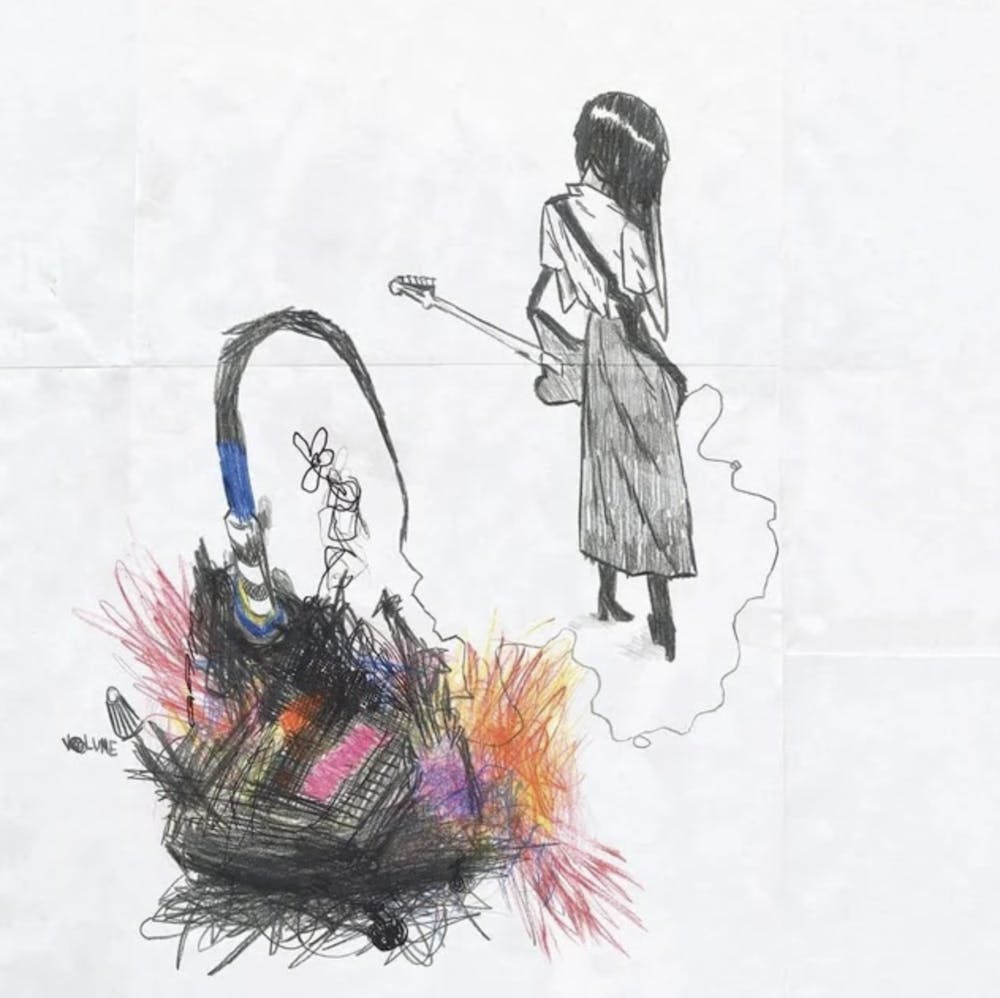When I first encountered Julie (stylized “julie”) almost a year ago, I was listening to “Catalogue.” At that point it was just an unsuspecting single on a dreary evening walk back from Davis. Their “zoomergaze” sound, a sort of Tiktok-ified mix of shoegaze and grunge, had blipped on my radar a few times as more of a fleeting curiosity than a serious contender for my attention. “Catalogue,” however, had me hooked. The track’s delightful ability to switch between sour melancholy and heart-pounding euphoria exemplified the California trio’s maturity, and I was eager to await their first full-length project.
Now, almost a full year later, it’s here. “My Anti-Aircraft Friend” (“MAAF”), released on Sept. 13, illustrates that while Julie have not challenged their sonic blueprint much, they’ve expanded upon it greatly.
“MAAF” falls at what many music-site purists and industry veterans hope is the end of a shoegaze resurgence, one that has perhaps outstayed the initial spotlight of the genre. Their critique: The revival has aged like a teabag, and each cup is more watered down than the last — a sorry attempt at mimicry of the genre’s pioneers, My Bloody Valentine, Slowdive and company.
I, myself, was having trouble believing that the trend would be broken by three friends, a bunch of early twenty-somethings originally united by their love for those same greats. Keyan Pourzand, Alex Brady and Dillon Lee met in high school. Their first release, “Flutter,” went viral, racking up nearly 40 million listens and firmly placing them in the spotlight as a band to watch.
“Catalogue,” the song that introduced me to the group, heads the album. At the peaks of the song, Brady’s raw declaration “I don’t feel anything now” becomes a visceral shibboleth, citing an emotional numbness that threads its way across the LP. In retrospect, my reservations about this current iteration of shoegaze might have been spurred from familiar tones being played to a tempo and energy more akin to punk and post-shoegaze bands like Whirr and Nothing. The opening track incorporates this unexpected mix that I now embrace with open arms.
The following track, “Tenebrist,” is the album’s angstiest. A twangy opening explodes into a frenetic verse, and Pourzand’s first vocal contributions to the album highlight a relationship gone awry. He laments within a “smoke-filled room,” a potential ode to the artistic style of tenebrism referenced in the tracks title, a contrast of light and dark emblematic of our subject’s isolation. He continues, “you lost your head, you lost me now,” which finalizes the tumultuous emotions on display in one of the album's most compelling songs.
Tracks three and four, “Very Little Effort” and “Clairborne Practice,” continue the rhythmic onslaught through two standout performances from Lee on the drums. However, here also emerges one of the album's few weaknesses: lyrical thematic repetitions. Much of what is said on these two tracks could have just as well been used on “Tenebrist,” but I will praise the introduction of Pourzand and Brady’s joint vocals — the dichotomy of which furthers the relationship themes key to the album.
When “MAAF” was announced, I was ecstatic to hear that Julie would be working with producer Sonny Diperri, whose work on DIIV’s “Deceiver” yielded one of my favorite albums of all time. I was curious whether the slower-paced gaze sound Diperri formulated on “Deceiver” would translate to this album. If it has, it is on tracks five and six, “Knob” and “Thread, Stitch.” While the latter maintains its fair share of forceful moments, the larger part of this mid-album respite ebbs and flows slowly. Lines such as “could you believe your eyes? all you'd say is wake up and make your mind” arouse the regret of a late-night pandemic doom scroll — a wistful introspection bare in its honesty.
Track seven, “Feminine Adornments,” is an early Autolux-esque percussive powerhouse and stands as one of the instrumental triumphs of “MAAF.” The song is a reverberated mass of snow rolling down the slope to a furious resolution, taking plenty of unexpected turns along the way. Brady shines vocally and unabashed lyrics (“I’ll come around, I’ll defile”) mark “Feminine Adornments” as our shoegazing chronicler’s retaking of control.
Tracks eight and nine, “I’ll Cook My Own Meals” and “Piano Instrumental,” serve as less titillating reprisals of the album’s already situated themes. Though the latter contains a surge that isn’t found elsewhere on the LP and is sure to become one of the band’s mosh classics.
“MAAF”’s last song, “Stuck in a Car with Angels,” showcases Brady guiding listeners through a ballad that stands as a startling departure from the album's prevailing tone. In simple refrains, the album is concluded in masterful fashion. The final track is a testament to Julie’s ability to grow and expand upon their sound.
As it stands, shoegaze isn’t going anywhere, and why should it? The genre of perturbation and isolation is more relevant now than ever. With a world in tumult, who’s more equipped to take the torch than a generation of artists whose early adolescence has been stained by social unrest, dopamine addictions and a pandemic. Julie have managed to harness this unease in a sonic journal with a degree of skill that should be respected and celebrated as a poignant reflection of our times.




